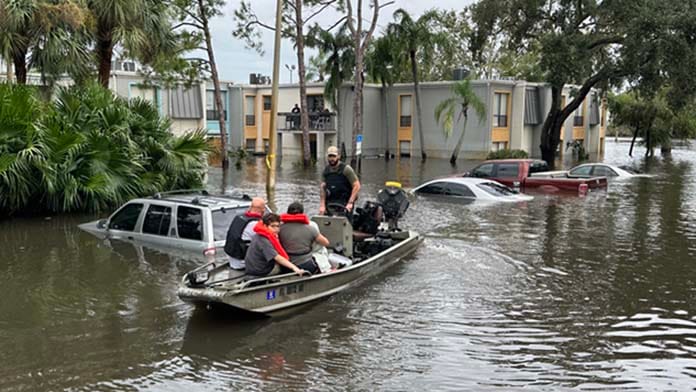Last month, Hurricane Helene and Milton ripped through Florida, killing 241 people and wiping out hundreds of billions in homes and infrastructure. A few weeks later, intense flash floods in Spain trapped thousands, killing more than 200.
These catastrophes are a sign of what’s to come as scientists warn that climate-induced natural disasters are increasing in frequency and severity, as fossil fuel usage is propped up in the interest of militarisation and maintaining the profits of fossil fuel mega-corporations.
A recent “State of the Climate” report published by climate scientists paints a grim picture: the past year has been the world’s hottest on record, and there has been no progress on transitioning away from fossil fuels. Instead, fossil fuel consumption has increased—coal use by 1.6 per cent, and oil by 2.5 per cent.
Our climate is already changing. Record-high ocean temperatures create the ideal conditions for more frequent and more intense hurricanes and storms, and at shorter notice.
Hurricanes can absorb heat from ocean water as they form, so that warmer waters provide more energy to the storm.
With waters in the Gulf of Mexico this year around 2 degrees hotter than usual, climate change has already made hurricanes 2.5 times more likely to develop.
Florida was first hit by Hurricane Helene, which formed, intensified, and hit land in just three days as a Category 4 hurricane.
It was one of the largest hurricanes ever to hit the US at around 640 kilometres wide, dropping 42 trillion gallons of water and wreaking havoc with wind speeds of 225 kilometres per hour. It saw 227 people killed, making Helene the second deadliest hurricane in US history.
Less than two weeks later, Florida was hit again by Hurricane Milton, which developed into a Category 5 hurricane in less than 12 hours, with wind speeds of 285 kilometres per hour. A further 14 were killed.
Six million people were placed under immediate evacuation orders, but many were not able to leave for economic reasons, such as lacking transportation, having disabilities, or requiring other supports.
Those that tried to leave were often stuck in huge traffic jams, with major highways clogged with cars for several hours.
Despite Florida’s hurricane-prone location, the government of Florida under Republican Ron DeSantis has upheld a policy of climate denialism.
He has banned any teaching about the climate crisis in schools, passed a law which outlawed municipalities creating heat protection restrictions for workers, and even passed a bill to delete all reference to climate change in government documents.
Earlier this year, he legislated to remove all climate targets from state statutes. He claimed the freak twin hurricanes had no connection to climate change, saying, “It is hurricane season. You are going to have tropical weather.”
Here in Australia the Labor government may give lip service to the need for climate action, but are in reality approving more and more fossil fuel projects, and leaving it to the private sector to construct alternative renewable energy infrastructure.
To stop runaway climate change from making severe climate disasters a routine reality, we need an immediate just transition to 100 per cent renewable energy.
By Maeve Larkins






